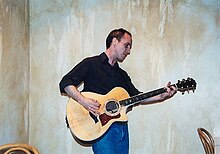Freedy Johnston
| Freedy Johnston | |
|---|---|

Freedy Johnston in Wichita, 1998
|
|
| Background information | |
| Origin | Kinsley, Kansas, United States |
| Genres | Power pop, rock |
| Occupation(s) | Musician, songwriter |
| Instruments | Vocals, Guitar |
| Years active | 1989–present |
| Labels |
Bar/None (1990–1993, 2010–present) Elektra (1994–2001) |
| Website | Freedy Johnston.com |
Freedy Johnston (born Frederic John Fatzer in 1961) is a New York City-based singer-songwriter originally from Kinsley, Kansas. He has scored several minor hits since the early 1990s. Johnston's songs are often about troubled loners, and cover topics like heartbreak, alienation and disappointment. Known for the craftsmanship of his songs, he has been described as a "songwriter's songwriter."
Johnston was raised in the small town of Kinsley, KS, pop. 1,658 (2009). His interest in music was hampered by the fact that there were no record shops or music stores in his hometown. When he was 16, he bought his first guitar from a mail order catalog, and at 17, had a friend drive him the 35 miles to the closest record store to buy an Elvis Costello album he had read about. When he graduated high school, and left to attend the University of Kansas, in Lawrence, Kansas, he immersed himself in the new wave music scene.
By 1985, with some songs he'd recorded on a four-track recorder he moved to New York City. With the typing skills he had acquired in high school, he supported himself in New York as an office worker at an architecture firm for a number of years, and in the restaurant industry, prior to pursuing music on a full-time basis. He decided to change his name to Freedy Johnston; "Freedy" was a nickname that his mother had given him, and Johnston was his mother's maiden name. After a few years there, he signed with independent label Bar None Records, and debuted just two tracks called Time for a Change, in 1989. His first album, The Trouble Tree, was released on Bar None Records in 1990. While the reviews were generally good, the album was not commercially successful.
Johnston sold some of his family's farmland to finance the recording of his second album, Can You Fly (an event he wrote about in a song on that album, "Trying to Tell You I Don't Know"). The album, released in 1992, was selected by the New York Times as one of the best albums of the year. Johnston followed up with his 1994 major label debut, This Perfect World, released on Elektra Records and produced by Butch Vig of Garbage. The album received rave reviews and led to Rolling Stone naming Johnston "songwriter of the year". Other publications, including The New York Times, Spin, and Musician Magazine gave the album high marks as well. It featured the single "Bad Reputation", which reached 54 on the Billboard Hot 100 and is one of his best-known songs. He released his next three albums under Elektra: Never Home (produced by Danny Kortchmar), Blue Days Black Nights (produced by T-Bone Burnett, who had also produced Elvis Costello) and Right Between the Promises, all of which earned both respectful reviews and some degree of commercial success.
...
Wikipedia
